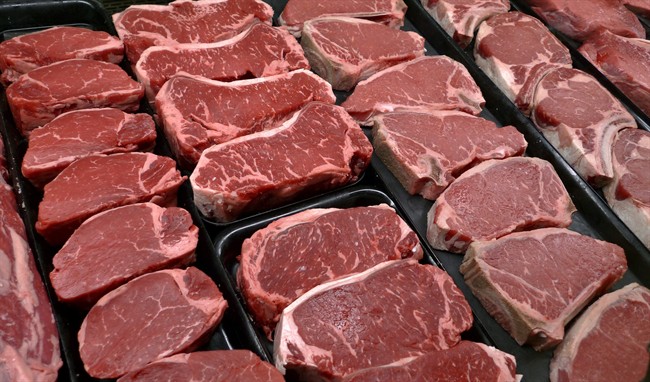Bacon, ham, hamburger and sausage – are these potentially cancer-causing?

An international panel of health experts has been working to answer that question, and will deliver its findings on Monday.
Earlier this month, the World Health Organization’s International Agency for Research on Cancer (IARC) met to discuss red meat and processed meat.
The meat industry is preparing for the answer – some say if IARC says red and processed meats are carcinogenic it would lead to a major shift in the industry. Others think it will lead to more consumer-focussed diet recommendations.
READ MORE: Study links red meat to breast cancer but not all experts convinced
The North American Meat Institute (NAMI) believes, “scientific evidence shows cancer is a complex disease not caused by single foods and that a balanced diet and healthy lifestyle choices are essential to good health,” said Barry Carpenter, NAMI President and CEO.
NAMI responded to a media report in Britain’s Daily Mail that stated IARC will give processed meat the highest carcinogenic risk rating and red meat the second-highest one.
“Red and processed meat are among 940 substances reviewed by IARC found to pose some level of theoretical ‘hazard.’ Only one substance, a chemical in yoga pants, has been declared by IARC not to cause cancer,” said Carpenter.
IARC called the leaked reports “random” and stated “there was NO breach of embargo, as no embargoed material was shared with any news outlet, in Britain or elsewhere.”
The public debate shows how heated IARC’s evaluation is and decision will be.
According to the Canadian Cancer Society, “research shows that a diet high in red meat and eating processed meat increases the risk of colorectal cancer. The reasons why red and processed meat increase the risk of colorectal cancer are currently being studied.
The cancer society also recommends Canadians limit their red and processed meat intake.
IARC’s review will be released Monday in Paris.
Canadian Cancer Society’s advice to reduce risk:
- One serving of meat, fish or poultry is roughly 85 grams (3 ounces) when cooked – this is smaller than a deck of cards.
- Choose poultry or fish more often. Make up the rest of your meal with vegetables and healthy grains.
- Eat more alternatives to meat. When making a chili or stew, cut the meat quantity in half and replace it with double the quantity of beans or other legumes.
- Make meats go further by chopping them into small pieces or buying them ground and using smaller amounts in stir fries, salads and pasta sauces.
- Make at least one supper a week meat-less.
- Trim off visible fat from meat. Remove skin from poultry. This will reduce the amount of harmful chemicals that are created from burning fat.
- When barbequing, choose lean cuts of meats, poultry and seafood over higher fat meats. This will reduce the amount of harmful chemicals from the smoke created by burning fat.
- Barbecue slowly and keep the food away from the hot coals so that flames are less likely to engulf the food to prevent charring.
- Cook meat, fish, seafood and poultry at lower temperatures by braising, stewing, steaming or roasting more often.
- Use high temperature cooking methods such as barbecuing, pan frying and broiling less often.
- Thaw and partially cook meat in the microwave before cooking to lower the levels of HCAs. Pour off any liquid formed during microwaving to further help reduce HCA levels. Avoid making gravy from meat drippings.
- Marinate meat, poultry and fish before cooking. Studies have shown that marinating these foods can prevent the formation of cancer-causing chemicals. Use an oil-free marinade that contains a strong acid like lemon juice or balsamic vinegar.
- Try grilling vegetables, veggie burgers and fruit slices. Most experts agree that plant-based foods do not form the cancer-causing substances when cooked at high heat.
- Save processed meat for special occasions, such as ham for a holiday dinner or a hot dog at a sporting event.
- ‘She gets to be 10’: Ontario child’s heart donated to girl the same age
- Bird flu risk to humans an ‘enormous concern,’ WHO says. Here’s what to know
- Buzz kill? Gen Z less interested in coffee than older Canadians, survey shows
- Shoppers faces proposed class action over claims company is ‘abusive’ to pharmacists


Comments